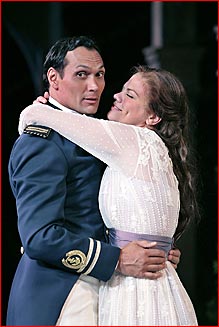
|
||
| Volume III, Issue II | Summer 2004 | |
| Summer 2004 Home Page |
| Culture/ Technology |
| Fiction |
| Music |
| Poetry |
| Theater |
| About / Contact |
| Archive |
| Current Home Page |
'Much Ado About Nothing' a delightful riff on male foolishness
Shakespeare takes on jealousy in popular comedy
By Lucy Komisar
NEW YORK
|
The real charmer of the piece is Jimmy Smits, who is as wide-eyed and tough guy a Benedick as you want to see. He segues smoothly from the cynic to the love-smitten. Esbjornson gives him some over-the-top bits, including a slapstick falling down a well in the garden while he's listening to his "friends" feed him the invention that Beatrice is mad for him. One of them nonchalantly throws orange peels down the well where Benedick is floundering.
 Jimmy Smits and Kristen Johnston Photo by Michael Daniel |
The theme of the play seems to be male foolishness. The ladies are more together. Beatrice, for example, is a cynic who might take on this swain, Benedick, but really seems not to take too seriously what's going on. Why do I think she's a New Yorker?
Don John, in black shirt and striped brown pants, is curiously a rather fey villain. Another Esbjornson first, since this fellow is usually pretty macho. His bad guy buddies wear gangster-style gray pin-striped suits, black shoes and spats.
A delightful cameo is Brian Murray's Dogberry, the sheriff in red hat and epaulets and wonderfully Malapropian phrases who – pulled into the scene in a boat as if from a Venetian canal – discovers the plotters in spite of himself.
Too over-the-top is Sam Waterston as Leonato, Hero's confused, anguished father. When he starts emoting, he seems like a noisy volcano (Vesuvius?) that no one can put out.
The major problem with the production is that you can't really believe that Beatrice and Benedick really love each other, even after their defenses have been destroyed by well-meaning friends. Nor Hero and Claudio, for that matter.
So, suspend belief. It's still a delightful production.
![]()
Summer 2004 Theater Section | Summer 2004 Main Page
Current Theater Section | Current Home Page
Copyright ©
Reprinted by permission of author, who retains all copyright and control.